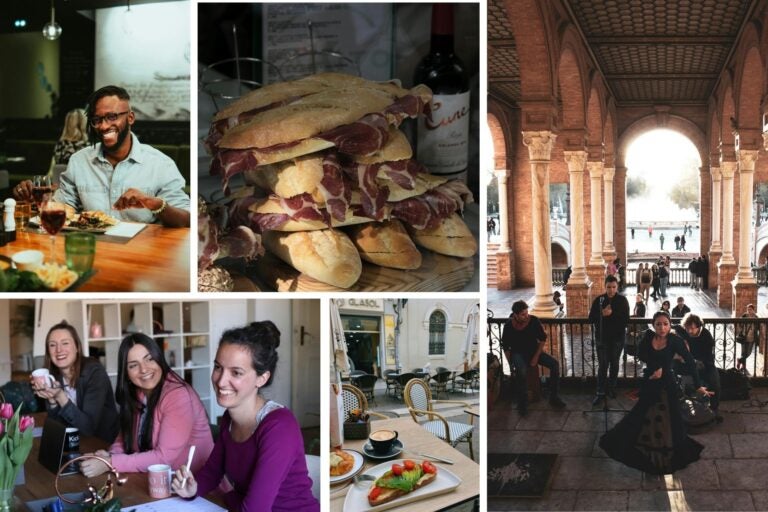Live in Seville: Learn advantages, disadvantages & costs
Come live in Seville, the birthplace of flamenco! If you love its culture, we will show you the quality of life this vibrant city offers.
Without a doubt, Sevilla is one of the most culturally rich cities in Spain and the birthplace of flamenco. Located in southern Spain, the capital of Andalusia has over 685,000 residents, making it the largest city in the region. Many foreigners are choosing to live in Seville and make it their home.
Seville attracts digital nomads looking to work remotely in great weather, students studying university degrees, Spanish, or flamenco, tourists staying longer to enjoy the sunny city, and retirees seeking a peaceful lifestyle.
In this article, we will explore what it’s like to live in Seville, from job prospects and the education system to healthcare access and neighborhood safety. We’ll also highlight the main advantages and drawbacks of moving here, using official data to help you make a confident decision.
Quality of life in Seville
Seville has a special charm that captures you from the moment you arrive. Many visitors who planned only a short stay end up making it their home. In the following sections, we will highlight what makes the city so attractive for workers, students, digital nomads, entrepreneurs, retirees, and slow travelers.
How to study in Seville
The educational opportunities in Seville are both high-quality and diverse. You can pursue university programs, but many foreigners also come to the city to explore the roots of flamenco or study Spanish at schools like CLIC International House and Enforex.
The University of Seville is considered one of the top 20 universities in Spain, according to the QS World University Rankings 2024, recognized for its strong academics and research programs. Founded in 1505, it is one of the city’s oldest institutions. If you are an international student, you can fund your studies through various scholarships offered by the Spanish government, Erasmus Plus, the MEC program, or the Carolina Foundation.
Students from an EU country, can live in Seville and study for up to 90 days without a visa. If you plan to stay longer or come from outside the EU, you will need to apply for a student visa at the Spanish embassy or consulate in your city.

Learn about Seville’s healthcare system
As a foreigner in Spain, there are several ways to access healthcare in Seville for free. Through the Andalusian Health Service (SAS), medical care is provided to legally resident foreigners who are registered in the city. To do this, you need to apply for a health card at any local health center. If you are from the EU, make sure to request a European Health Insurance Card (EHIC) in your home country, which allows you to receive care at any medical center or hospital with the same rights as locals. Some of the most well-known healthcare centers in Seville include:
- Virgen del Rocío University Hospital: One of the largest in Spain, with leading medical specialties.
- Virgen Macarena University Hospital: Very well equipped and with 24-hour emergency services.
- Quirónsalud Sagrado Corazón: Private option with excellent facilities and care in English.
If you are not working, you can still access healthcare through the Special Agreement with the Andalusian Social Security system, which provides medical services for a monthly fee. For those without sufficient resources, there is also the option of applying for a special healthcare assistance document.
Safety on the streets of Seville
Life in Seville is considered safe. According to Spain’s Ministry of the Interior, crime in the city dropped by 4.5% in 2023 compared to the previous year. The strong presence of both local and national police, especially in tourist areas, also helps keep petty theft and robberies under control.
If safety is a priority, some of the best neighborhoods to live in Seville are Los Remedios, Nervión, El Porvenir, and Triana. These areas attract families, students, and professionals, making them lively but secure places to settle. By contrast, zones like Polígono Sur or Torreblanca tend to have more issues after dark, so it’s worth being extra mindful if you spend time there.

The economy in Seville
Seville’s economy thrives on industries like tourism, agriculture, logistics, and services. So if you’re planning to live in Seville to start a business or join the local workforce, you’ll find the best opportunities in these areas:
- Tourism and hospitality
- Technology and software development
- Language teaching (especially English)
- Customer service and remote services
The cost of living in Spain is generally moderate, lower than in countries like the UK or France. In Seville, it’s even more affordable compared to larger Spanish cities such as Madrid or Barcelona. According to Spain’s National Statistics Institute (INE), the average annual salary here is about $24,700.
This is what technological connectivity is like in Seville
You’ll be glad to know the city has excellent internet coverage. Most neighborhoods are connected to high speed fiber, with major providers like Movistar, Vodafone, Orange, Digi, and MásMóvil widely available. According to Ookla’s 2024 Speedtest Global Index, fixed broadband in the city center averages around 300 Mbps download speed, making it easy to work remotely without interruptions.
If you enjoy shopping online, living in Seville makes it easy. Big platforms like Amazon, Zalando, PcComponentes, El Corte Inglés, and Carrefour deliver straight to your door, often within just 24 hours. On top of that, food delivery services such as Glovo, Uber Eats, and Just Eat are widely available, so you can order anything from a full meal to supermarket essentials and have it at home in no time.
Seville has plenty of coworking spaces like WorkINCompany, Arcadia Coworking, or Spaces, all offering fast and reliable Wi-Fi so you can work remotely without issues. Still, if you want guaranteed connectivity wherever you are in the city, Holafly’s monthly plans are a great option. For $64.90, you get unlimited data, 5G coverage, and the ability to stay connected on two devices at once.
Important: If you are a frequent traveler and want to stay connected without worrying about expensive roaming or looking for a new SIM at every destination, Holafly’s subscription plans are for you. With a single eSIM, enjoy internet in more than 170 countries for a fixed price and no surprises on your bill. Travel without limits and connect easily and securely! 🚀🌍

What are the advantages of living in Seville?
There are plenty of benefits to living in Seville, whether for work, study, or personal life. Beyond the services we’ve already discussed, the city is a food lover’s paradise, where you can enjoy delicious meals under beautiful sunny skies and easily make friends with the warm and welcoming locals. Here are some more advantages Seville has to offer:
- Pleasant climate: Winters in Seville are mild, and the city enjoys over 300 days of sunshine each year, making it perfect for outdoor activities or even working remotely from a park or a sunny terrace.
- Affordable rent: Living in Seville is more affordable than in many other Spanish cities, and rental prices are generally reasonable. For example, one-bedroom apartments can start around $674 per month, while coliving spaces are available from about $572.
- Flamenco culture: If you love flamenco, Seville is the perfect place to experience it at every turn, with numerous tablaos, festivals, exhibitions, concerts, and the famous April Fair.
- Connections to other destinations: Seville’s international airport, San Pablo, offers daily flights to European cities like Paris, Rome, Lisbon, and London at affordable rates. You can also take the high-speed AVE train and reach Madrid in under two and a half hours.
- Excellent cuisine: Eating in Seville is both affordable and delicious. The city has numerous local markets with fresh, high-quality produce, as well as restaurants where you can enjoy famous dishes like tapas, jamón ibérico, salmorejo, and fried fish.

Disadvantages of living in Seville
Relocating to another country always comes with some challenges. Things like the weather, local culture, language, and how people interact can influence your adjustment. Seville doesn’t have any major issues that would make living here a problem, but it’s helpful to be aware of a few potential drawbacks before making your decision:
- Hot summers: In July and August, temperatures can climb above 40°C, making daytime activities challenging and making air conditioning essential at home.
- Low salaries: Unemployment in Andalusia is higher than in other parts of Spain, and salaries tend to be lower. This can make it harder to find skilled jobs, especially if you are not fluent in Spanish.
- Slow bureaucracy: Like in most Spanish cities, administrative processes can be slow. It’s a good idea to have all your documents ready and be prepared for long waits before starting any procedures.
- Limited job opportunities: Seville offers fewer job opportunities in the tech and scientific sectors, so if your career is in these fields, your options may be more limited.
Frequently asked questions about living in Seville
Seville is generally a safe city, though, like anywhere, it’s wise to stay alert, especially during festivals or in busy tourist areas. Some of the calmest neighborhoods to live in are Los Remedios, Nervión, and Triana.
You don’t always need it, but since many shops, services, and administrative processes operate only in Spanish, having some basic knowledge of the language will make adapting to life in Seville much smoother.
Some of the safest neighborhoods to live in Seville include Nervión, which is modern and well connected; Triana, known for its charm and local vibe; Los Remedios, a quiet and residential area; and El Porvenir, peaceful and close to the city center.
Yes, more and more digital nomads are choosing to live in Seville, along with Erasmus students. On social media, you can find groups of foreigners in the city to connect with, and there are plenty of coworking spaces and events for digital professionals.
Living in Seville and covering rent, food, transportation, and leisure can cost between $1,125 and $1,570 per month, depending on your lifestyle and the type of housing you choose.





 Language
Language 


















 No results found
No results found



